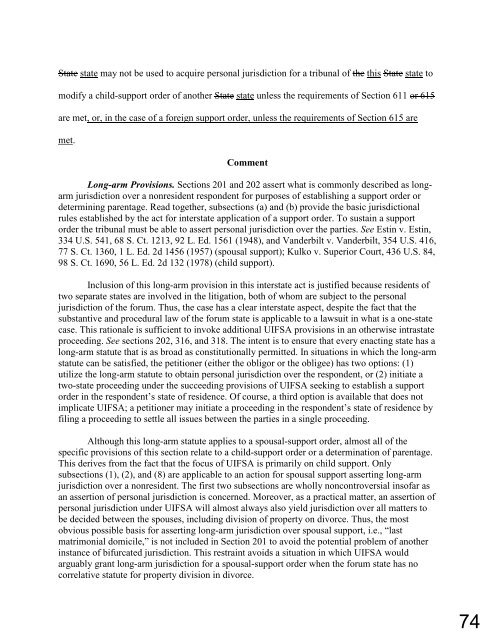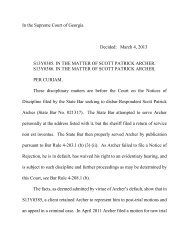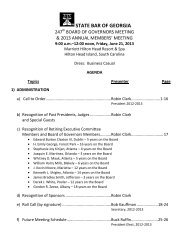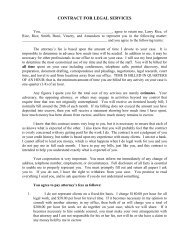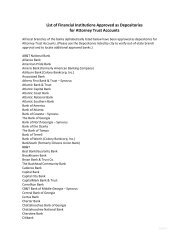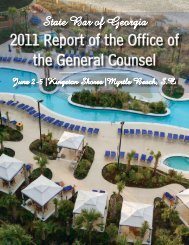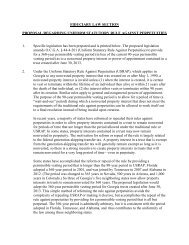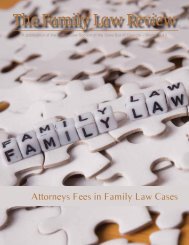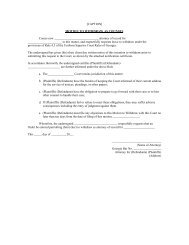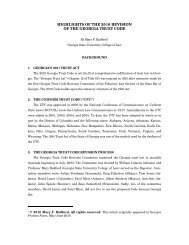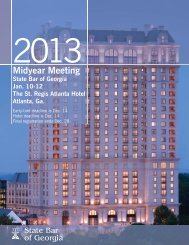2008 Amendments to the Uniform Interstate Family Support Act ...
2008 Amendments to the Uniform Interstate Family Support Act ...
2008 Amendments to the Uniform Interstate Family Support Act ...
You also want an ePaper? Increase the reach of your titles
YUMPU automatically turns print PDFs into web optimized ePapers that Google loves.
State state may not be used <strong>to</strong> acquire personal jurisdiction for a tribunal of <strong>the</strong> this State state <strong>to</strong><br />
modify a child-support order of ano<strong>the</strong>r State state unless <strong>the</strong> requirements of Section 611 or 615<br />
are met, or, in <strong>the</strong> case of a foreign support order, unless <strong>the</strong> requirements of Section 615 are<br />
met.<br />
Comment<br />
Long-arm Provisions. Sections 201 and 202 assert what is commonly described as longarm<br />
jurisdiction over a nonresident respondent for purposes of establishing a support order or<br />
determining parentage. Read <strong>to</strong>ge<strong>the</strong>r, subsections (a) and (b) provide <strong>the</strong> basic jurisdictional<br />
rules established by <strong>the</strong> act for interstate application of a support order. To sustain a support<br />
order <strong>the</strong> tribunal must be able <strong>to</strong> assert personal jurisdiction over <strong>the</strong> parties. See Estin v. Estin,<br />
334 U.S. 541, 68 S. Ct. 1213, 92 L. Ed. 1561 (1948), and Vanderbilt v. Vanderbilt, 354 U.S. 416,<br />
77 S. Ct. 1360, 1 L. Ed. 2d 1456 (1957) (spousal support); Kulko v. Superior Court, 436 U.S. 84,<br />
98 S. Ct. 1690, 56 L. Ed. 2d 132 (1978) (child support).<br />
Inclusion of this long-arm provision in this interstate act is justified because residents of<br />
two separate states are involved in <strong>the</strong> litigation, both of whom are subject <strong>to</strong> <strong>the</strong> personal<br />
jurisdiction of <strong>the</strong> forum. Thus, <strong>the</strong> case has a clear interstate aspect, despite <strong>the</strong> fact that <strong>the</strong><br />
substantive and procedural law of <strong>the</strong> forum state is applicable <strong>to</strong> a lawsuit in what is a one-state<br />
case. This rationale is sufficient <strong>to</strong> invoke additional UIFSA provisions in an o<strong>the</strong>rwise intrastate<br />
proceeding. See sections 202, 316, and 318. The intent is <strong>to</strong> ensure that every enacting state has a<br />
long-arm statute that is as broad as constitutionally permitted. In situations in which <strong>the</strong> long-arm<br />
statute can be satisfied, <strong>the</strong> petitioner (ei<strong>the</strong>r <strong>the</strong> obligor or <strong>the</strong> obligee) has two options: (1)<br />
utilize <strong>the</strong> long-arm statute <strong>to</strong> obtain personal jurisdiction over <strong>the</strong> respondent, or (2) initiate a<br />
two-state proceeding under <strong>the</strong> succeeding provisions of UIFSA seeking <strong>to</strong> establish a support<br />
order in <strong>the</strong> respondent’s state of residence. Of course, a third option is available that does not<br />
implicate UIFSA; a petitioner may initiate a proceeding in <strong>the</strong> respondent’s state of residence by<br />
filing a proceeding <strong>to</strong> settle all issues between <strong>the</strong> parties in a single proceeding.<br />
Although this long-arm statute applies <strong>to</strong> a spousal-support order, almost all of <strong>the</strong><br />
specific provisions of this section relate <strong>to</strong> a child-support order or a determination of parentage.<br />
This derives from <strong>the</strong> fact that <strong>the</strong> focus of UIFSA is primarily on child support. Only<br />
subsections (1), (2), and (8) are applicable <strong>to</strong> an action for spousal support asserting long-arm<br />
jurisdiction over a nonresident. The first two subsections are wholly noncontroversial insofar as<br />
an assertion of personal jurisdiction is concerned. Moreover, as a practical matter, an assertion of<br />
personal jurisdiction under UIFSA will almost always also yield jurisdiction over all matters <strong>to</strong><br />
be decided between <strong>the</strong> spouses, including division of property on divorce. Thus, <strong>the</strong> most<br />
obvious possible basis for asserting long-arm jurisdiction over spousal support, i.e., “last<br />
matrimonial domicile,” is not included in Section 201 <strong>to</strong> avoid <strong>the</strong> potential problem of ano<strong>the</strong>r<br />
instance of bifurcated jurisdiction. This restraint avoids a situation in which UIFSA would<br />
arguably grant long-arm jurisdiction for a spousal-support order when <strong>the</strong> forum state has no<br />
correlative statute for property division in divorce.<br />
74


